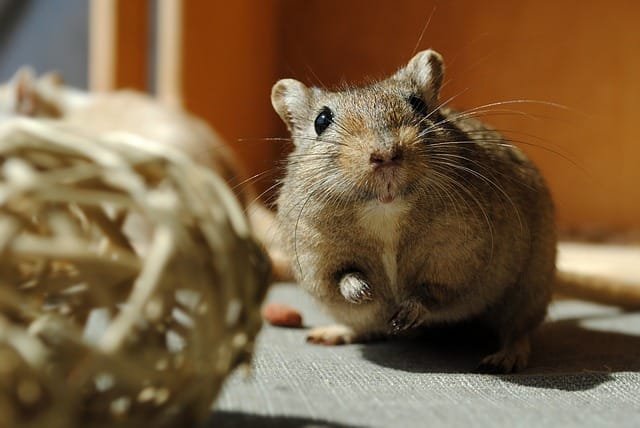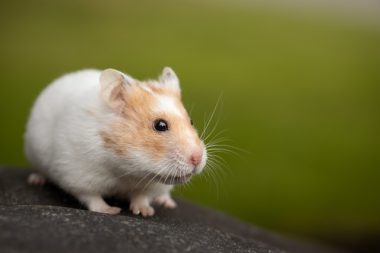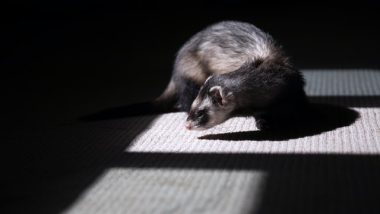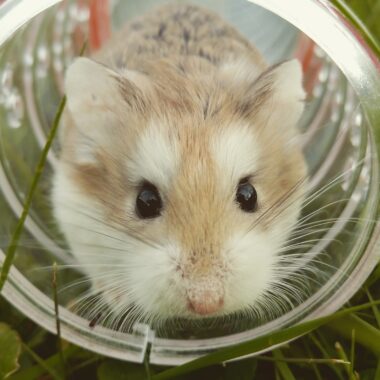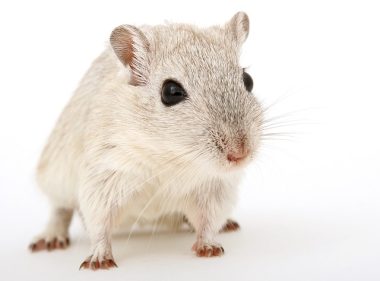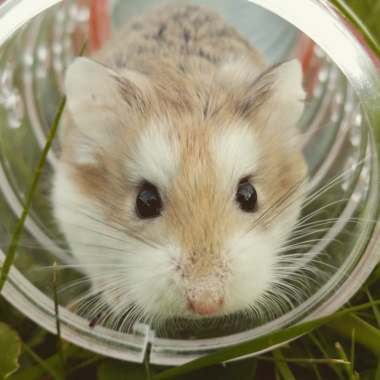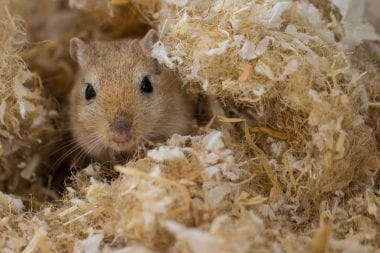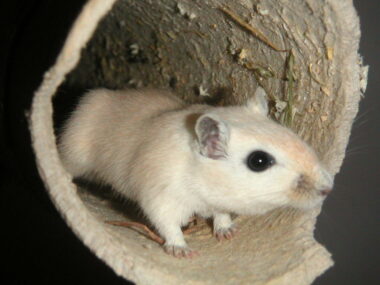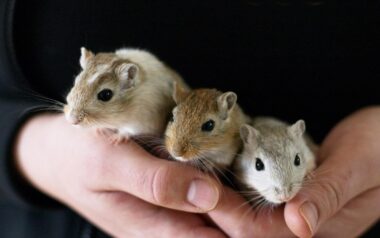Gerbils are sociable and sensitive creatures that make for great household pets. These tiny rodents require good levels of care to live a healthy life. Like cavies, gerbils are frisky and can breed frequently upon reaching sexual maturity. If you are a pet parent to gerbils, it is essential that you think twice before breeding them. A pair of gerbils can actually give birth to around 50 gerbil pups during their reproductive life span! You can easily get overwhelmed with the whole process unless and until you have a plan for what to do with the babies. You will need to have sufficient space, cages, and resources to raise the young ones. You will also need to find suitable homes for the young pups after they are weaned and become independent.
Gerbils, both males, and females become sexually mature at around 3-4 months of age. Younger females who are paired with an adult male may reach sexual maturity a little earlier. Female gerbils go into heat once every four days. If they are being bred, healthy male and female gerbils can be introduced to each other between 3-18 months of age. They can be gradually introduced to each other using split cages. Once introduced to each other physically, the gerbils will mate.
Female gerbils usually come into season early in the evening. This is followed by mating. Gerbils will not mate once. When female gerbils are in heat, the males will mount them and they will mate several times for about 1-4 days. Mating between gerbils can be a noisy affair. Their process is long and involves foot thumping or drumming of feet, squeaking, chasing, and mounting of the females by the males. The females will present themselves to the males to be impregnated. Once they have finished mating, gerbils tend to bend over and groom or clean their genital region.
Given their prolific capacity for reproduction, you may be curious to know how many babies can a gerbil have. Knowing the answer to how many babies can a gerbil have will help you be better prepared to deal with a pregnant gerbil and care for the litter of newly born pups.
Pregnancy in Gerbils
Most often, mating between gerbils ends in a successful pregnancy. Otherwise, the male and the female will mate again once the female goes into heat. Pregnant female gerbils will require extra care and nourishment. She will need to be given extra protein, water, and warm, soft bedding to help her give birth safely.
The duration of a gerbil’s pregnancy is short and lasts between 21-25 days. On average, the pups are born after 24 days. Gerbils do not show signs of pregnancy early on. Since the gestation period is quite short, you will have little time to prepare for the babies. Females will only begin to show their pregnancy in the last 2-3 days. During these last few days, her belly will appear to be slightly swollen. She may also become hostile to the male in the cage and the male may need to be separated for the last few days until she gives birth.
The cage or ‘gerbilarium’ must be large enough for the mother and her babies. The father can be introduced into the cage immediately after the delivery of the babies. The mother will start building a nest with the nesting materials you provide 1-2 days before delivery. Gerbils are highly independent creatures and the females require no help to deliver their babies. You may only notice the sign of birth when you hear the squeaking sounds made by the newborn pups.
Caring for Pregnant Gerbils
To ensure a safe and comfortable delivery, you will need to provide nesting materials like soft fleece blankets, soft hay, paper towels, or paper pulp bedding to help the mother build a nest. You will also need to provide extra water through water bottles attached to the lower ends of the cages. Water bottles are better than dishes or bowls as the tiny pups can drown in the bowls. Any heavy toys, balls, and exercise wheels must be removed from the cage. The babies’ feet and tails can get trapped in these toys and they may get serious or life-threatening injuries.
Pregnant gerbils will consume a lot more fat and protein during pregnancy. She requires the extra energy and nutrients to support the growing fetuses. Her meals can include mealworms, crickets, seeds, nuts, boiled or scrambled eggs, or low-lactose cheese. She will gain some weight during the pregnancy and will drink extra water to keep herself hydrated. During the last few days of the pregnancy, she will avoid being touched and it’s best to leave her be. She may be aggressive or feisty than usual and will show discomfort at carrying the extra weight.
Female gerbils usually go into labor and will give birth in the middle of the night. The mother will not require any help from you. They are highly independent and will groom their pups as soon as they are born. This stimulates breathing in the newborns and helps clean them. She will also consume her own placenta after delivery. Gerbil mothers may also eat any weak, unhealthy, or stillborn babies. This is a natural process and you mustn’t interfere with it even if you are surprised or alarmed. Alternately, if you notice any dead pups in the cage, you can remove and dispose of them safely.
One of the things to look out for immediately after birth is that gerbils will mate again on the same day they give birth. This is actually quite normal and common as gerbils have two litters in a row! Nursing the first litter of pups will delay the implantation of the embryos in the females. The second litter will be delivered only between 28-43 days after the birth of the first litter. If at this stage you do not want any additional gerbil babies, you will have to separate the mother from the father.
How Many Babies Can a Gerbil Have?
Now that you are familiar with the process of pregnancy and birth, you may want to know how many babies can a gerbil have. This will help you be prepared for the incoming litters.
Gerbils are generally monogamous in nature. Once paired, gerbils will mate at around 3-4 months of age once they reach sexual maturity. After an average of 24 days, the first litter is born. Gerbils can have between 1-10 pups per litter. Litters of 3-8 pups are more common among healthy females. The average litter size for a healthy female gerbil in her prime is 6 pups. Gerbils who are very young or older females are more likely to have few pups or smaller litter sizes.
Despite the average litter size, it is not uncommon to see females give birth to only 1-2 pups. In rare cases, when females give birth to only one or two pups, they may not have sufficient stimulus to care for and raise the pups. The pups may pass away after 1-2 days. Mothers with litters of more than 8 pups will have a hard time feeding them all at once. Female gerbils have only eight nipples and a larger litter may prove difficult to manage. On rare occasions, the mother will eat the runt of the litter who is weak or will struggle to survive. In such cases, if you want the baby to survive, you may feed it with a kitten milk replacer.
Gerbils can also mate as soon as they have delivered the first litter. This second litter will be born approximately 28-43 days after the first litter of pups. This is a natural instinct and you may end up with more than a dozen baby gerbils after mating season.
In rare cases, your gerbil may be infertile. Infertility in gerbils may be caused by several reasons such as old age, sexual immaturity, ovarian cysts, nutritional deficiencies, illnesses, or exposure to certain toxins or pesticides. Infertility may also be caused by environmental factors such as low temperatures, environmental disturbances, overcrowding, or incompatibility with mates.
There are several causes of infertility in gerbils, including ovarian cysts, old age, sexual immaturity, exposure to pesticides or other toxins, nutritional deficiencies, and disease. Ovarian cysts can lead to infertility in older females and smaller litter sizes. Environmental causes of infertility in gerbils include overcrowding, incompatibility with a potential mate, environmental disturbances, and low temperatures.

Caring for Gerbil Pups
Once you are aware of how many babies can a gerbil have, you will need to take some steps to care for the newborn babies. Gerbil babies are born blind, deaf, and hairless. They consume their mother’s milk till they are about 4 weeks of age after which, they begin to be weaned. Gerbils can begin from sexual activity as young as 9 to 12 weeks. It isn’t ideal for a gerbil so young to become pregnant. It is important to separate gerbils into same-sex enclosures before they are 8 weeks old.
Gerbil parents are instinctively good caretakers and do not require any assistance from you to raise their young ones. In fact, male gerbils are excellent fathers and help raise the pups along with the mothers. There is no need to separate the father from the mother and pups unless you do want a second litter. Gerbils will mate on the same day of the delivery and get pregnant soon after. Pups of other gerbils must not be introduced to another mother. Gerbil mothers are notorious for killing the offspring born to other couples.
Young pups are extremely vulnerable and dependant on their parents for food and warmth. They cannot regulate their body temperatures and are sensitive to outside intervention. So it is best that you do not touch the babies or clean the cage for the first few days of the babies’ lives. You may also see the mother and father move the pups, gather them or kick them while digging and nesting. This is quite common and nothing to worry about as the pups are not harmed.
Gerbil pups are weaned at around 4 weeks of age. At this age, they begin to consume solid foods and drink water independently. It is best to leave the babies with the parents until they are about 6-7 weeks old to complete their physical, social, and emotional development. At around 8 weeks, they must be separated by sex to prevent breeding and territorial conflicts with their parents.
Once you know how many babies can a gerbil have, you will care for your pregnant gerbil and her babies better once they are born. You can also avoid any future and unwanted pregnancies and provide good foster care to the babies till they are adopted into good homes.
